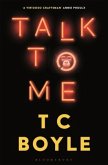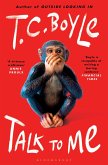THE #1 INTERNATIONAL BESTSELLER
'Bernhard Schlink speaks straight to the heart' New York Times
Olga is an orphan raised by her grandmother in a Prussian village around the turn of the 20th century. Smart and precocious, she fights against the prejudices of the time to find her place in a world that sees her as second-best.
When she falls in love with Herbert, a local aristocrat obsessed with the era's dreams of power, glory and greatness, her life is irremediably changed.
Theirs is a love against all odds, entwined with the twisting paths of German history, leading us from the late 19th to the early 21st century, from Germany to Africa and the Arctic, from the Baltic Sea to the German south-west.
This is the story of that love, of Olga's devotion to a restless man - told in thought, letters and in a fateful moment of great rebellion.
Hinweis: Dieser Artikel kann nur an eine deutsche Lieferadresse ausgeliefert werden.
'Bernhard Schlink speaks straight to the heart' New York Times
Olga is an orphan raised by her grandmother in a Prussian village around the turn of the 20th century. Smart and precocious, she fights against the prejudices of the time to find her place in a world that sees her as second-best.
When she falls in love with Herbert, a local aristocrat obsessed with the era's dreams of power, glory and greatness, her life is irremediably changed.
Theirs is a love against all odds, entwined with the twisting paths of German history, leading us from the late 19th to the early 21st century, from Germany to Africa and the Arctic, from the Baltic Sea to the German south-west.
This is the story of that love, of Olga's devotion to a restless man - told in thought, letters and in a fateful moment of great rebellion.
Hinweis: Dieser Artikel kann nur an eine deutsche Lieferadresse ausgeliefert werden.
From the author of The Reader comes a brilliant new novel about history and the nature of memory... The story of Olga, translated here from German by Charlotte Collins, is the story of Germany's modern history. It is also a study of memory... You should read this novel if you appreciate the power of history. How do we remember each other? As individuals, or as parts of a larger whole? As they were, or as we wish they had been? The narration can be breakneck: decades pass in single sentences, while other paragraphs describe mere moments. This is the effect of memory; lives are condensed into a series of experiences and relationships. One line still sticks in my head, in a letter from a Norwegian bookseller. "History is not the past as it really was. It's the shape we give it". Evening Standard
"Two world wars and the passage of more than a century do not overshadow [Bernhard Schlink's] story of lovers who never fully belong to each other, just as they never fully belonged to the world." - Booklist
"Readers who love rich character studies will want to pick this up." - Publishers Weekly
"Olga is captivating. Bernhard Schlink tells the story in lucid, serene language... He is a master" - Stern
"One of Bernhard Schlink's secrets stems from his ability to craft stories from the generational schisms that occupied a single lifetime. Olga is another stellar example of it." - Le Monde
"A cleverly-constructed tale of cross-class romance... Olga's story draws us into a present-day reckoning with Germany's past."
- Mail on Sunday
"A poignant portrait of a woman out of step with her time." - The Guardian
"From the author of The Reader comes a brilliant new novel about history and the nature of memory." - Evening Standard (London)
"Schlink frames the novel as a search for meaning, which dances in Olga between a multitude of timeframes and territories. Throughout, Charlotte Collins's translation is careful and beautifully paced." - Financial Times
"A compelling tale of love and thwarted dreams... Schlink's lucid, no-frills prose lends his novel immediacy, and at times potency, and gives us a character to root for."
- The Herald (UK)
"Schlink tells a gripping, true-to-life story which startles you with its unforeseen twists, and not only makes you think, but feel too."
- NDR Kultur
"Olga is a searching examination of modern Germany and its scarred soul... there's a sophisticated precision to [Schlink's] writing, which is superbly translated by Charlotte Collins." - Sunday Telegraph
"Misdirection can be as useful a trick in storytelling as it is in magic. It may be tempting to follow the trail of a character who plunges into the thick of the action, but sometimes it's better to stick with the one who has been left behind. That's certainly the case in Bernhard Schlink's Olga." - New York Times Book Review
"Readers who love rich character studies will want to pick this up." - Publishers Weekly
"Olga is captivating. Bernhard Schlink tells the story in lucid, serene language... He is a master" - Stern
"One of Bernhard Schlink's secrets stems from his ability to craft stories from the generational schisms that occupied a single lifetime. Olga is another stellar example of it." - Le Monde
"A cleverly-constructed tale of cross-class romance... Olga's story draws us into a present-day reckoning with Germany's past."
- Mail on Sunday
"A poignant portrait of a woman out of step with her time." - The Guardian
"From the author of The Reader comes a brilliant new novel about history and the nature of memory." - Evening Standard (London)
"Schlink frames the novel as a search for meaning, which dances in Olga between a multitude of timeframes and territories. Throughout, Charlotte Collins's translation is careful and beautifully paced." - Financial Times
"A compelling tale of love and thwarted dreams... Schlink's lucid, no-frills prose lends his novel immediacy, and at times potency, and gives us a character to root for."
- The Herald (UK)
"Schlink tells a gripping, true-to-life story which startles you with its unforeseen twists, and not only makes you think, but feel too."
- NDR Kultur
"Olga is a searching examination of modern Germany and its scarred soul... there's a sophisticated precision to [Schlink's] writing, which is superbly translated by Charlotte Collins." - Sunday Telegraph
"Misdirection can be as useful a trick in storytelling as it is in magic. It may be tempting to follow the trail of a character who plunges into the thick of the action, but sometimes it's better to stick with the one who has been left behind. That's certainly the case in Bernhard Schlink's Olga." - New York Times Book Review








